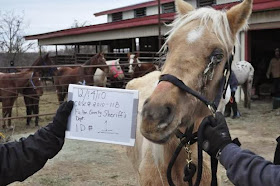ARKANSAS -- The case file at the Fulton County Courthouse says the trial for 51-year-old Rodney Kankey is set to begin in December, some three years after the Viola man was arrested on five felony and 113 misdemeanor charges of animal cruelty.
But 16th Judicial District Prosecuting Attorney Don McSpadden, citing what he called a flawed investigation, said it would be difficult to get a conviction and that the charges against Kankey would likely be dropped.
On Dec. 9, 2010, authorities with the Fulton County Sheriff’s Office, assisted by the ASPCA and HSUS, served a search warrant on Kankey’s Viola farm, seizing more than 110 starving, sick and injured horses.
Three weeks after the seizure, following an exhaustive investigation, officials brought the five felony and 113 misdemeanor charges against Kankey, who was arrested and taken to the Fulton County jail. He eventually was released after posting a $100,000 bond.
Reasonable doubt in question
For 106 days, the seized horses were housed in the former Mountain Home Sale Barn. During that time, many local residents brought donations of both equine supplies and cash to the barn. County jail inmates helped volunteers from across the country care for the horses during a cold winter.
The horses were then moved to a farm in central Arkansas before being released to horse rescue organizations as the civil and criminal cases tortuously wound their way through the legal system.
“It wouldn’t be easy to get a conviction on this case,” McSpadden said. “Kankey was in jail when the search warrant was executed. You get into a question of being able to prove beyond a reasonable doubt he was responsible.”
There are other problems with the case, according to McSpadden.
“One of the people involved left their organization under not-so-good circumstances,” McSpadden said. “Plus, there are other credibility issues that I won’t go into detail about.”
McSpadden also made reference to a problem with one of the investigators.
“One of the problems with cases like this is that the investigators involved think they have a stronger case than they actually do,” McSpadden said. “Sometimes people let that become part of the problem rather than part of the solution.”
Kankey’s Mountain Home attorney, John O. Russo, also cited problems he believed existed from the beginning of the investigation.
“This case occurred before Buck Foley became Sheriff of Fulton County. I believe that if Buck Foley had been Sheriff then, and Deputy Prosecuting Attorney Dwayne Plumlee had been consulted before the issuance of a search warrant in this case, this case would never had gone this far,” Russo said in statement emailed to The Baxter Bulletin on Tuesday.
“No one ever bothered to consult with the Prosecuting Attorney’s office before getting a search warrant or going to the press. Since this case began, my client has maintained his innocence and requested his day in Court. We are glad to see that Justice has prevailed.”
'I won't ever forget'
Lance Gray was a deputy with the Fulton County Sheriff’s Office at the time Kankey was arrested.
Gray was a deputy for approximately three years prior to the Kankey case. Gray served as the primary law enforcement officer on the case, with help from others. Approximately 18 months after Kankey was arrested, Gray was fired from his job. Gray says to this day he does not know why he was fired.
“This was my first animal cruelty case of this magnitude,” Gray said from his Craighead County home Tuesday.
On Monday, Gray contacted a colleague at the Fulton County Sheriff’s Office after hearing a rumor the animal cruelty charges against Kankey were going to be dropped.
“I spoke with a Fulton County deputy on Monday who knows about this case, and he said it’s probably going to be dismissed,” Gray said. “I called the secretary at the prosecutor’s office and she said she had not heard anything about the case against Kankey being dismissed.”
Gray, who says no one from law enforcement or the prosecutor’s office has contacted him regarding the case in almost two years, said he left all his contact information with the prosecutor’s office Tuesday and told the secretary he would gladly testify.
“I’m willing to testify now just like I was back when I was a deputy,” Gray said. “People who move on from law enforcement are often called to testify for cases they worked.”
Gray says the case has stuck with him, and he remembers it well.
“This case is important to me, just like it’s important to lots of other people,” Gray said. “I haven’t forgotten what was done to those horses. I won’t ever forget.”
“If the charges are dropped in this case, it would be a great disappointment,” said Desiree Bender, who served as the Arkansas HSUS state director when the case began, and who also was involved in the investigation of the case and care for the horses. “This was a huge case, and rather than just drop it three years later, why not put the case before a judge and a jury and let them make the decision.”
The ASPCA and HSUS issued a joint statement Tuesday regarding the case and the latest development. The press release did not answer any of the four questions directly posed to the organizations. The press release stated the organizations were “disappointed” about charges against Kankey being dismissed, and went on to praise the work they did in rescuing the horses.
The final word
“For the record, I would like to state that I applaud Don McSpadden’s decision to dismiss the criminal charges against Rodney Kankey. There was a terrible disservice done by the individuals responsible for investigating this case,” Russo said in his email statement. “My client had been arrested on criminal charges alleging he had threatened his wife and was incarcerated from November 25 through December 13, 2010. Those charges were subsequently dismissed.
“My client, when arrested, told the arresting officers that there would be no one to take care of the horses. My client, after being released from jail, was denied access to his animals, count them, take inventory and was not allowed to care for them by law enforcement. When the officers got a search warrant, it was messed up. They used a drug search warrant and had the wrong information listed. To this day, we have never received detailed information from law enforcement about what horses were sick, injured or mistreated.”
(
Baxter Bulletin - Oct. 16, 2013)















































